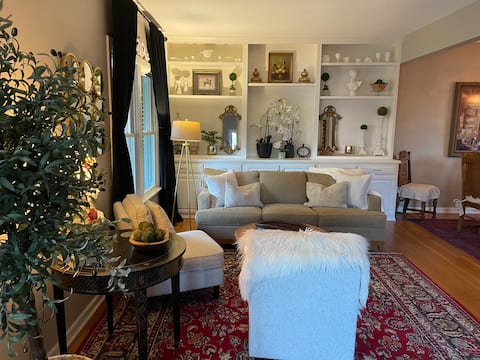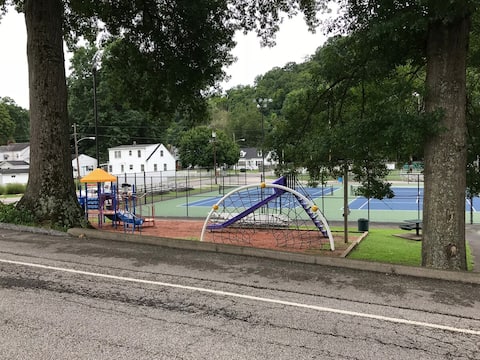Charleston Airbnb Market Analysis 2026: Short Term Rental Data & Vacation Rental Statistics in West Virginia, United States
Is Airbnb profitable in Charleston in 2026? Explore comprehensive Airbnb analytics for Charleston, West Virginia, United States to uncover income potential. This 2026 STR market report for Charleston, based on AirROI data from February 2025 to January 2026, reveals key trends in the niche market of 110 active listings.
Whether you're considering an Airbnb investment in Charleston, optimizing your existing vacation rental, or exploring rental arbitrage opportunities, understanding the Charleston Airbnb data is crucial. Leveraging the low regulation environment is key to maximizing your short term rental income potential. Let's dive into the specifics.
Key Charleston Airbnb Performance Metrics Overview
Monthly Airbnb Revenue Variations & Income Potential in Charleston (2026)
Understanding the monthly revenue variations for Airbnb listings in Charleston is key to maximizing your short term rental income potential. Seasonality significantly impacts earnings. Our analysis, based on data from the past 12 months, shows that the peak revenue month for STRs in Charleston is typically October, while February often presents the lowest earnings, highlighting opportunities for strategic pricing adjustments during shoulder and low seasons. Explore the typical Airbnb income in Charleston across different performance tiers:
- Best-in-class properties (Top 10%) achieve $3,917+ monthly, often utilizing dynamic pricing and superior guest experiences.
- Strong performing properties (Top 25%) earn $2,776 or more, indicating effective management and desirable locations/amenities.
- Typical properties (Median) generate around $1,661 per month, representing the average market performance.
- Entry-level properties (Bottom 25%) see earnings around $933, often with potential for optimization.
Average Monthly Airbnb Earnings Trend in Charleston
Charleston Airbnb Occupancy Rate Trends (2026)
Maximize your bookings by understanding the Charleston STR occupancy trends. Seasonal demand shifts significantly influence how often properties are booked. Typically, Julysees the highest demand (peak season occupancy), while January experiences the lowest (low season). Effective strategies, like adjusting minimum stays or offering promotions, can boost occupancy during slower periods. Here's how different property tiers perform in Charleston:
- Best-in-class properties (Top 10%) achieve 79%+ occupancy, indicating high desirability and potentially optimized availability.
- Strong performing properties (Top 25%) maintain 63% or higher occupancy, suggesting good market fit and guest satisfaction.
- Typical properties (Median) have an occupancy rate around 45%.
- Entry-level properties (Bottom 25%) average 26% occupancy, potentially facing higher vacancy.
Average Monthly Occupancy Rate Trend in Charleston
Average Daily Rate (ADR) Airbnb Trends in Charleston (2026)
Effective short term rental pricing strategy in Charleston involves understanding monthly ADR fluctuations. The Average Daily Rate (ADR) for Airbnb in Charleston typically peaks in October and dips lowest during April. Leveraging Airbnb dynamic pricing tools or strategies based on this seasonality can significantly boost revenue. Here's a look at the typical nightly rates achieved:
- Best-in-class properties (Top 10%) command rates of $208+ per night, often due to premium features or locations.
- Strong performing properties (Top 25%) achieve nightly rates of $155 or more.
- Typical properties (Median) charge around $114 per night.
- Entry-level properties (Bottom 25%) earn around $75 per night.
Average Daily Rate (ADR) Trend by Month in Charleston
Get Live Charleston Market Intelligence 👇

Explore Real-time Analytics
Airbnb Seasonality Analysis & Trends in Charleston (2026)
Peak Season (October, July, September)
- Revenue averages $2,676 per month
- Occupancy rates average 51.9%
- Daily rates average $141
Shoulder Season
- Revenue averages $2,050 per month
- Occupancy maintains around 44.3%
- Daily rates hold near $136
Low Season (February, March, April)
- Revenue drops to average $1,571 per month
- Occupancy decreases to average 42.7%
- Daily rates adjust to average $119
Seasonality Insights for Charleston
- The Airbnb seasonality in Charleston shows highly seasonal trends requiring careful strategy. While the sections above show seasonal averages, it's also insightful to look at the extremes:
- During the high season, the absolute peak month showcases Charleston's highest earning potential, with monthly revenues capable of climbing to $3,133, occupancy reaching a high of 55.0%, and ADRs peaking at $151.
- Conversely, the slowest single month of the year, typically falling within the low season, marks the market's lowest point. In this month, revenue might dip to $1,352, occupancy could drop to 39.0%, and ADRs may adjust down to $115.
- Understanding both the seasonal averages and these monthly peaks and troughs in revenue, occupancy, and ADR is crucial for maximizing your Airbnb profit potential in Charleston.
Seasonal Strategies for Maximizing Profit
- Peak Season: Maximize revenue through premium pricing and potentially longer minimum stays. Ensure high availability.
- Low Season: Offer competitive pricing, special promotions (e.g., extended stay discounts), and flexible cancellation policies. Target off-season travelers like remote workers or budget-conscious guests.
- Shoulder Seasons: Implement dynamic pricing that balances peak and low rates. Target weekend travelers or specific events. Offer slightly more flexible terms than peak season.
- Regularly analyze your own performance against these Charleston seasonality benchmarks and adjust your pricing and availability strategy accordingly.
Best Areas for Airbnb Investment in Charleston (2026)
Exploring the top neighborhoods for short-term rentals in Charleston? This section highlights key areas, outlining why they are attractive for hosts and guests, along with notable local attractions. Consider these locations based on your target guest profile and investment strategy.
| Neighborhood / Area | Why Host Here? (Target Guests & Appeal) | Key Attractions & Landmarks |
|---|---|---|
| Downtown Charleston | The historic heart of the city, known for its beautiful architecture, rich history, and vibrant culture. Attracts tourists interested in sightseeing, dining, and cultural experiences. | State Capitol, Cultural Center, Capitol Market, Coonskin Park, Charleston Town Center |
| East End | A charming neighborhood featuring historic homes and a tight-knit community atmosphere. Ideal for those looking for a local experience with easy access to city amenities. | West Virginia State Museum, Bullitt Park, Armstrong Park, Muse Plaza |
| South Charleston | A suburban area with family-friendly amenities and attractions, popular with travelers looking for nearby access to downtown Charleston while enjoying a quieter setting. | Little Creek Park, South Charleston Memorial Ice Arena, Charleston Town Center, Scioto River |
Understanding Airbnb License Requirements & STR Laws in Charleston (2026)
While Charleston, West Virginia, United States currently shows low STR regulations, specific Airbnb license requirements might still exist or change. Always verify the latest short term rental regulations and Airbnb license requirements directly with local government authorities for Charleston to ensure full compliance before hosting.
(Source: AirROI data, 2026, finding no licensed listings among those analyzed)
Top Performing Airbnb Properties in Charleston (2026)
Benchmark your potential! Explore examples of top-performing Airbnb properties in Charlestonbased on Trailing Twelve Month (TTM) revenue. Analyze their characteristics, revenue, occupancy rate, and ADR to understand what drives success in this market.

The Ruffner
Entire Place • 6 bedrooms

Old Woodland Acres For Groups by Request
Entire Place • 7 bedrooms

Central Charleston Craftsman
Entire Place • 4 bedrooms

Beautiful South Hills Home
Entire Place • 4 bedrooms

Cozy kanawha city home - Walk to CAMC Hospital
Entire Place • 3 bedrooms

Trier Loft at Renaissance Tower
Entire Place • 1 bedroom
Note: Performance varies based on location, size, amenities, seasonality, and management quality. Data reflects the past 12 months.
Top Performing Airbnb Hosts in Charleston (2026)
Learn from the best! This table showcases top-performing Airbnb hosts in Charleston based on the number of properties managed and estimated total revenue over the past year. Analyze their scale and performance metrics.
| Host Name | Properties | Grossing Revenue | Stay Reviews | Avg Rating |
|---|---|---|---|---|
| C. Anthony | 6 | $179,714 | 976 | 4.92/5.0 |
| Nancy | 5 | $147,561 | 279 | 4.89/5.0 |
| Derrick Wilhelm | 3 | $112,814 | 937 | 4.97/5.0 |
| Charles | 6 | $106,231 | 453 | 4.71/5.0 |
| Nikki | 1 | $99,002 | 18 | 5.00/5.0 |
| Jennifer | 2 | $67,648 | 302 | 4.95/5.0 |
| Rita | 10 | $62,023 | 301 | 4.81/5.0 |
| Sarah | 1 | $53,365 | 46 | 4.96/5.0 |
| Sheila | 1 | $49,899 | 11 | 4.82/5.0 |
| Dean | 1 | $44,161 | 206 | 5.00/5.0 |
Analyzing the strategies of top hosts, such as their property selection, pricing, and guest communication, can offer valuable lessons for optimizing your own Airbnb operations in Charleston.
Dive Deeper: Advanced Charleston STR Market Data (2026)
Ready to unlock more insights? AirROI provides access to advanced metrics and comprehensive Airbnb data for Charleston. Explore detailed analytics beyond this report to refine your investment strategy, optimize pricing, and maximize your vacation rental profits.
Explore Advanced MetricsCharleston Short-Term Rental Market Composition (2026): Property & Room Types
Room Type Distribution
Property Type Distribution
Market Composition Insights for Charleston
- The Charleston Airbnb market composition is heavily skewed towards Entire Home/Apt listings, which make up 81.8% of the 110 active rentals. This indicates strong guest preference for privacy and space.
- Looking at the property type distribution in Charleston, House properties are the most common (60%), reflecting the local real estate landscape.
- Houses represent a significant 60% portion, catering likely to families or larger groups.
- Smaller segments like hotel/boutique, others (combined 3.6%) offer potential for unique stay experiences.
Charleston Airbnb Room Capacity Analysis (2026): Bedroom Distribution
Distribution of Listings by Number of Bedrooms
Room Capacity Insights for Charleston
- The dominant room capacity in Charleston is 2 bedrooms listings, making up 32.7% of the market. This suggests a strong demand for properties suitable for couples or solo travelers.
- Together, 2 bedrooms and 1 bedroom properties represent 56.3% of the active Airbnb listings in Charleston, indicating a high concentration in these sizes.
- A significant 28.1% of listings offer 3+ bedrooms, catering to larger groups and families seeking more space in Charleston.
Charleston Vacation Rental Guest Capacity Trends (2026)
Distribution of Listings by Guest Capacity
Guest Capacity Insights for Charleston
- The most common guest capacity trend in Charleston vacation rentals is listings accommodating 4 guests (23.6%). This suggests the primary traveler segment is likely small families or groups.
- Properties designed for 4 guests and 2 guests dominate the Charleston STR market, accounting for 42.7% of listings.
- 25.4% of properties accommodate 6+ guests, serving the market segment for larger families or group travel in Charleston.
- On average, properties in Charleston are equipped to host 3.9 guests.
Charleston Airbnb Booking Patterns (2026): Available vs. Booked Days
Available Days Distribution
Booked Days Distribution
Booking Pattern Insights for Charleston
- The most common availability pattern in Charleston falls within the 271-366 days range, representing 40% of listings. This suggests many properties have significant open periods on their calendars.
- Approximately 76.4% of listings show high availability (181+ days open annually), indicating potential for increased bookings or specific owner usage patterns.
- For booked days, the 91-180 days range is most frequent in Charleston (39.1%), reflecting common guest stay durations or potential owner blocking patterns.
- A notable 23.6% of properties secure long booking periods (181+ days booked per year), highlighting successful long-term rental strategies or significant owner usage.
Charleston Airbnb Minimum Stay Requirements Analysis
Distribution of Listings by Minimum Night Requirement
1 Night
40 listings
36.4% of total
2 Nights
24 listings
21.8% of total
3 Nights
4 listings
3.6% of total
4-6 Nights
8 listings
7.3% of total
7-29 Nights
11 listings
10% of total
30+ Nights
23 listings
20.9% of total
Key Insights
- The most prevalent minimum stay requirement in Charleston is 1 Night, adopted by 36.4% of listings. This highlights the market's preference for shorter, flexible bookings.
- A significant segment (20.9%) caters to monthly stays (30+ nights) in Charleston, pointing to opportunities in the extended-stay market.
Recommendations
- Align with the market by considering a 1 Night minimum stay, as 36.4% of Charleston hosts use this setting.
- Explore offering discounts for stays of 30+ nights to attract the 20.9% of the market seeking extended stays.
- Adjust minimum nights based on seasonality – potentially shorter during low season and longer during peak demand periods in Charleston.
Charleston Airbnb Cancellation Policy Trends Analysis (2026)
Limited
1 listings
0.9% of total
Super Strict 30 Days
3 listings
2.7% of total
Flexible
33 listings
30% of total
Moderate
22 listings
20% of total
Firm
34 listings
30.9% of total
Strict
17 listings
15.5% of total
Cancellation Policy Insights for Charleston
- The prevailing Airbnb cancellation policy trend in Charleston is Firm, used by 30.9% of listings.
- There's a relatively balanced mix between guest-friendly (50.0%) and stricter (46.4%) policies, offering choices for different guest needs.
Recommendations for Hosts
- Consider adopting a Firm policy to align with the 30.9% market standard in Charleston.
- Regularly review your cancellation policy against competitors and market demand shifts in Charleston.
Charleston STR Booking Lead Time Analysis (2026)
Average Booking Lead Time by Month
Booking Lead Time Insights for Charleston
- The overall average booking lead time for vacation rentals in Charleston is 30 days.
- Guests book furthest in advance for stays during May (average 46 days), likely coinciding with peak travel demand or local events.
- The shortest booking windows occur for stays in January (average 22 days), indicating more last-minute travel plans during this time.
- Seasonally, Spring (39 days avg.) sees the longest lead times, while Winter (26 days avg.) has the shortest, reflecting typical travel planning cycles.
Recommendations for Hosts
- Use the overall average lead time (30 days) as a baseline for your pricing and availability strategy in Charleston.
- For May stays, consider implementing length-of-stay discounts or slightly higher rates for bookings made less than 46 days out to capitalize on advance planning.
- Target marketing efforts for the Spring season well in advance (at least 39 days) to capture early planners.
- Monitor your own booking lead times against these Charleston averages to identify opportunities for dynamic pricing adjustments.
Popular & Essential Airbnb Amenities in Charleston (2026)
Amenity Prevalence
Amenity Insights for Charleston
- Essential amenities in Charleston that guests expect include: Air conditioning, Wifi, Kitchen, Smoke alarm, Heating, Coffee maker. Lacking these (any) could significantly impact bookings.
- Popular amenities like Hot water, TV, Dishes and silverware are common but not universal. Offering these can provide a competitive edge.
Recommendations for Hosts
- Ensure your listing includes all essential amenities for Charleston: Air conditioning, Wifi, Kitchen, Smoke alarm, Heating, Coffee maker.
- Prioritize adding missing essentials: Kitchen, Smoke alarm, Heating, Coffee maker.
- Consider adding popular differentiators like Hot water or TV to increase appeal.
- Highlight unique or less common amenities you offer (e.g., hot tub, dedicated workspace, EV charger) in your listing description and photos.
- Regularly check competitor amenities in Charleston to stay competitive.
Charleston Airbnb Guest Demographics & Profile Analysis (2026)
Guest Profile Summary for Charleston
- The typical guest profile for Airbnb in Charleston consists of primarily domestic travelers (97%), often arriving from nearby Charleston, typically belonging to the Post-2000s (Gen Z/Alpha) group (50%), primarily speaking English or Spanish.
- Domestic travelers account for 97.3% of guests.
- Key international markets include United States (97.3%) and DC (0.8%).
- Top languages spoken are English (79.3%) followed by Spanish (9.9%).
- A significant demographic segment is the Post-2000s (Gen Z/Alpha) group, representing 50% of guests.
Recommendations for Hosts
- Target domestic marketing efforts towards travelers from Charleston and Morgantown.
- Tailor amenities and listing descriptions to appeal to the dominant Post-2000s (Gen Z/Alpha) demographic (e.g., highlight fast WiFi, smart home features, local guides).
- Highlight unique local experiences or amenities relevant to the primary guest profile.
- Consider seasonal promotions aligned with peak travel times for key origin markets.
Nearby Short-Term Rental Market Comparison
How does the Charleston Airbnb market stack up against its neighbors? Compare key performance metrics like average monthly revenue, ADR, and occupancy rates in surrounding areas to understand the broader regional STR landscape.
| Market | Active Properties | Monthly Revenue | Daily Rate | Avg. Occupancy |
|---|---|---|---|---|
| Sugar Grove | 16 | $6,172 | $489.99 | 43% |
| Creola | 18 | $5,899 | $403.00 | 53% |
| Hocking County | 11 | $5,712 | $508.21 | 49% |
| Rockbridge | 229 | $5,257 | $400.48 | 46% |
| Logan | 688 | $4,907 | $388.67 | 45% |
| Berne Township | 15 | $4,897 | $490.66 | 37% |
| Swan Township | 111 | $4,727 | $334.40 | 49% |
| South Bloomingville | 129 | $4,565 | $312.34 | 48% |
| Laurelville | 145 | $4,519 | $348.68 | 45% |
| Blacksburg | 297 | $4,116 | $509.14 | 40% |